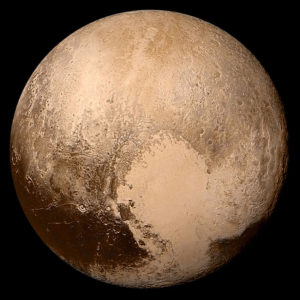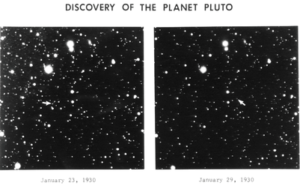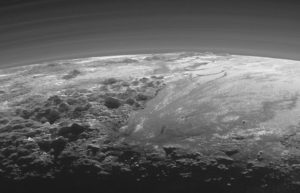One year ago today, on July 14th, 2015, the New Horizons space probe passed by the dwarf planet Pluto, scanning its surface with a multitude of research experiments, cameras, scanners, and more to try to gather all the information we could on it, and it’s moons, during our one time fly-by of this much beloved little ice ball of a world.
The reaction from people on the news of this was something different though. People were asking why did we bother, since Pluto “isn’t a planet?” Not withstanding that New Horizons was launched in January 2006 many months before Pluto was demoted from Planet to Dwarf Planet, this shows an absolute ignorance as to what these terms mean, which falls under the same thought process as those laypersons who whine about the demotion of Pluto.
Let’s discuss this, in the most simple and direct way possible, shall we? It’s been a about decade since this decision was made, and I’m actually quite tired of explaining it to people day in, day out.
In 2005, the International Astronomical Union was in a deep debate over just what should qualify as a proper planet. Several objects had been discovered which fit the classic description, but were very different from more “normal” planets, like Earth or Jupiter – these objects were all occupying similar orbits around the same range as Pluto. We needed to define things better, since the classical definition of planet was based on the original Greek words for wandering star, “asteres planetai.”
Planetai became the word Planet, which became what we used to describe those 6 main objects we could see move about the sky: Mercury, Venus, Mars, Jupiter, and Saturn. Eventually, as we discovered how the solar system worked, Earth was realized to be a planet, and eventually Uranus, Neptune, and lastly Pluto would be discovered. We thought that was it, but we were wrong.
Eventually in the late 90’s and onward we began discovering many objects like Pluto. We also discovered Ceres, a massive, round, planet like object in the Asteroid belt that under any other circumstance would indeed be a reasonable, albeit small, planet; it’s location however kept it thought of more like an asteroid for many years.
By 2006, the time had come to properly define planet. The word never had an official meaning, since we didn’t think that planetary systems would be as complex as we now know they are. While heavily debated, even today, 3 criteria were determined:
- is in orbit around the Sun,
- has sufficient mass to assume hydrostatic equilibrium (a nearly round shape), and
- has “cleared the neighborhood” around its orbit.
It should be noted that these definitions only apply to our own Solar System, and not currently to planetary systems around other stars.
Pluto, Eris, Ceres, and other objects in our Solar System do not fit criteria 3: clearing the neighborhood of other major objects, and as such, Pluto, not fitting this criteria, was placed into a new category, Dwarf Planet.
People got pissed, to put it bluntly. At first even I thought “wait, what?” but once I read up on the details, it all made sense. Simply put, a planet must be round, orbiting the sun, and be able to dominate it’s orbit and not have anything else in the same general path as it, and Pluto couldn’t do the 3rd – it has probably thousands of objects in a very similar orbit, some bigger, or more massive, than it is!
Pluto just happened to be the first object discovered in this outer grouping, and it became the famous one. This doesn’t change what it is, an amazing world at the edge of our system that contains many secrets as to what our solar system was like in the early phases. It’s a beautiful, cold world of ices and rocky substrate that we are still, a year later, getting detailed info sent back to us on.
It doesn’t matter what we name or classify something as; that doesn’t change what it is. Pluto is Pluto, and I hope we will get more detailed exploration of it again soon.
https://en.wikipedia.org/wiki/Definition_of_planet
https://en.wikipedia.org/wiki/New_Horizons
https://en.wikipedia.org/wiki/IAU_definition_of_planet
https://en.wikipedia.org/wiki/Pluto



